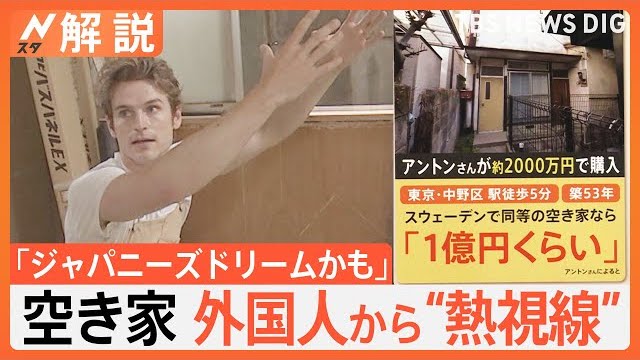TOKYO, Jun 11 (News On Japan) - Foreigners have been showing significant interest in Japan's vacant homes, commonly known as 'akiya,' due to the country's aging population and rural depopulation issues. But what kind of vacant homes are attracting these buyers?

Foreigners Drawn to Vacant Homes: "Everything I Was Looking For"
According to Aimi Yoshihara, the nationwide vacancy rate in 2023 was 13.8%, a slight increase from 2018. The highest rates were found in Wakayama and Tokushima prefectures at 21.2%, while Tokyo saw an increase to 11.0%.
In this context, vacant homes have become popular among foreigners. Miles from the U.S. bought a 56-year-old property in Aso City, Kumamoto Prefecture, as his new home. He remarked, 'Everything I was looking for was there.'
Aso City is welcoming to foreign residents, providing resources such as multilingual guides on waste disposal.
Takahiro Inoue, a news anchor, commented, 'It's heartening to see foreigners who appreciate old houses and want to live here.'
Obstetrician Mihyon Song added, 'It's delightful when people knowledgeable about traditional Japanese architecture, like tokonoma and engawa, choose these homes.'
A 53-Year-Old Property in Nakano Ward Purchased for ¥20 Million: "Old Means Cheap is a Strange Concept"
Anton from Sweden purchased a 53-year-old house in Tokyo's Nakano Ward, just a five-minute walk from the station, for approximately 20 million yen. He said, 'It's cheap compared to other countries.'
Anton explained that in Sweden, old homes don't depreciate in value. 'In good areas, houses that are 200-300 years old are common. The idea that "old means cheap" is strange.'
He sees the value in mixing old and new elements, stating, 'Akiya's benefit is combining the old with the new.' Anton plans to turn his renovated property into an inbound guesthouse.
Chiaki Horan, another news anchor, noted, 'Watching Anton's renovation on YouTube was fascinating; his DIY skills go beyond those of an amateur.'
Inoue added, 'Those with skills may find inspiration from the history and uniqueness of old properties.'
Weak Yen Fuels Akiya Boom: Properties Comparable to 100 Million Yen in Sweden
Yoshihara commented, 'This could be called an unprecedented akiya boom.'
According to Jiv, who supports foreign property purchases, 'The weak yen compared to 3-4 years ago makes now the time to buy.'
A seminar for foreign investors in April 2024 attracted over 80 participants. Anton mentioned that the 20 million yen house he bought in Nakano Ward would cost around 100 million yen in Sweden. He called it 'the Japanese dream' since he couldn't afford a house in his own country.
Song noted that in countries with fewer earthquakes, houses retain their value for centuries, but Japan's seismic standards vary by era. Strengthening earthquake resistance through renovation is essential.
Inoue mentioned that some buyers hold properties without living in or renting them, waiting for prices to rise. Without regulations, this could lead to Japanese being unable to buy homes while prices soar due to foreign investments.
Song added, 'It's sad if towns remain deserted.'
Horan concluded, 'Matchmaking between buyers and vacant homes can improve security and revive these areas.'
Source: TBS















